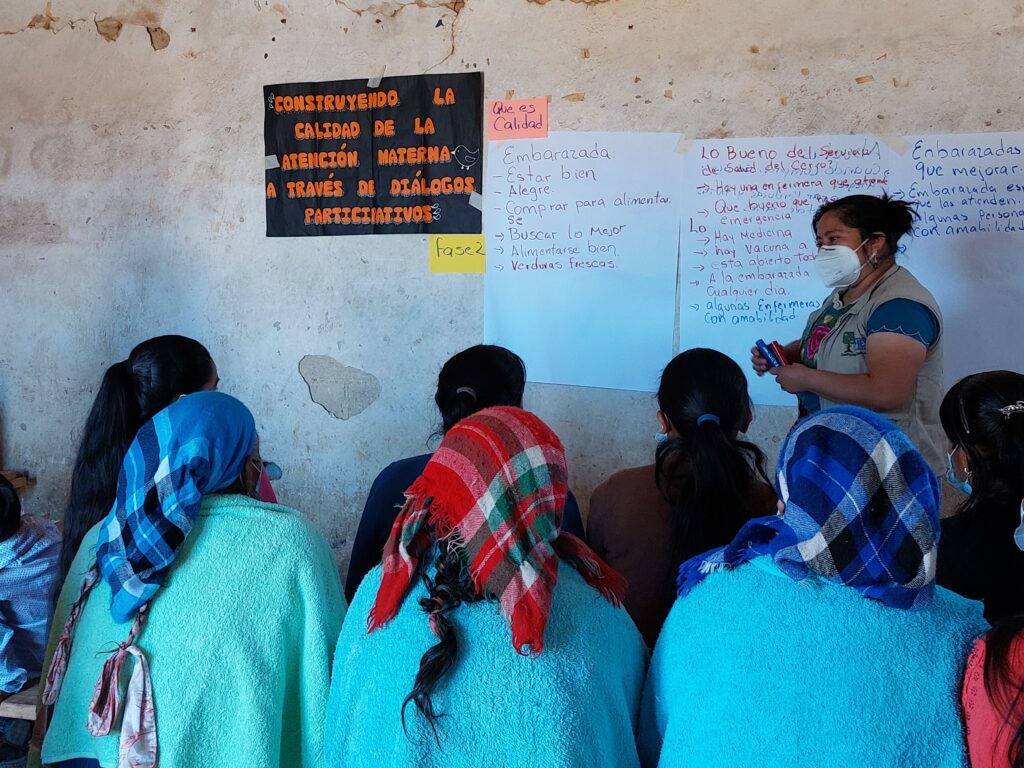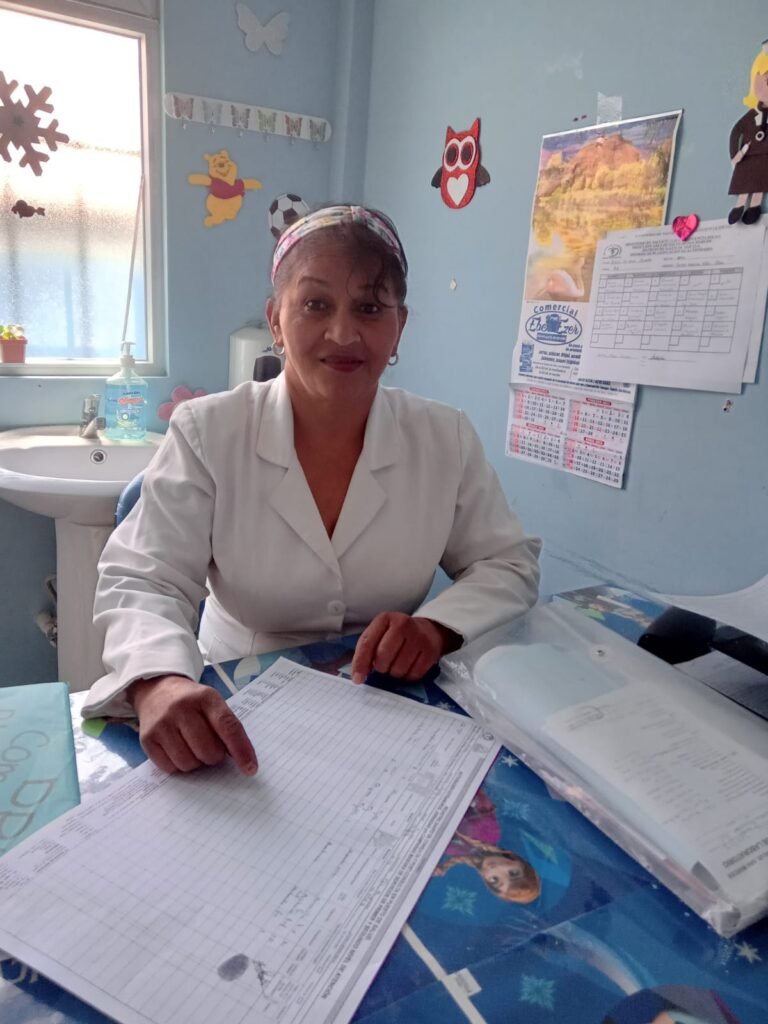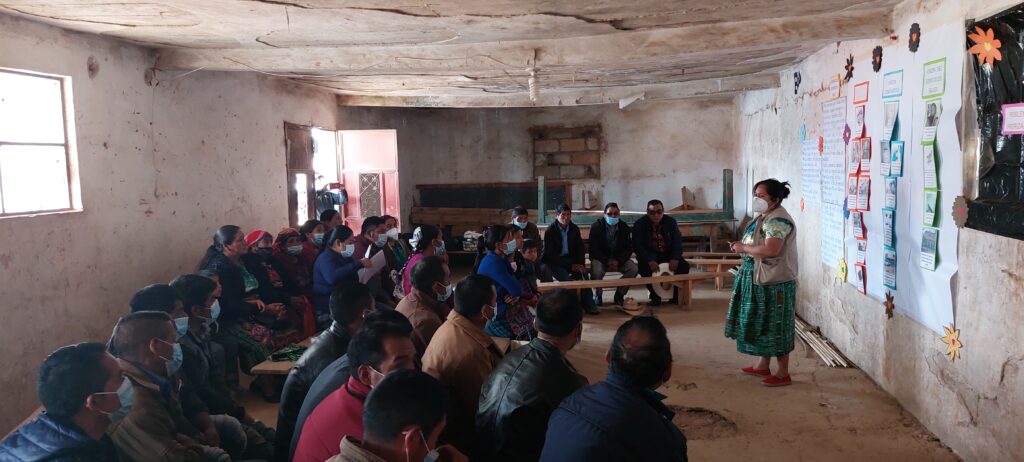Community Dialogues: How Indigenous Women Are Breaking Down Barriers, Transforming Maternal Health in Guatemala
Community Dialogues: How Indigenous Women Are Breaking Down Barriers, Transforming Maternal Health in Guatemala
By Jennifer Gardella

Most indigenous women living in the western highlands of Guatemala may prefer to seek antenatal care (ANC) with a comadrona, or traditional birth attendant, in accordance with their beliefs and customs. But when they look to obtain facility-based maternal health services, such as in the event of a pregnancy complication, receiving quality care is no easy feat. “[Women in these areas] face many barriers to access[ing] facility-based health care,” explains Aurora, a nurse at a village health post in Guatemala’s San Marcos department. “Sometimes, they walk long distances to the health posts and then experience language and cultural barriers when they get there,” she says. “There are not always the right medicines or vitamins available; if they are given a prescription, they do not have money to buy it. These are all common reasons why women do not come regularly for ANC services.”

These barriers have life-threatening impacts in the rural departments of Quetzaltenango and San Marcos, where most indigenous women facing complications during pregnancy begin ANC too late or don’t receive continuous care throughout their pregnancies. Nearly half of all births there still take place at home, attended by comadronas, rather than in health facilities. In Guatemala, indigenous women die in pregnancy and childbirth at more than twice the national rate—and almost 90% of these maternal deaths occur due to preventable and/or treatable causes.
Addressing these barriers and increasing the use of lifesaving health services begins with mobilizing and engaging communities to identify their specific health needs and develop targeted local strategies to improve their access to quality care. To do so, Management Sciences for Health (MSH) is implementing an innovative participatory intervention in Quetzaltenango and San Marcos through the Healthy Mothers and Babies in Guatemala project, known locally as Utz’ Na’n.
In collaboration with the Ministry of Public Health and Social Assistance (MSPAS) and local partner PIES de Occidente, the Utz’ Na’n project developed an adapted version of the Community Dialogues methodology. The approach features four phases: creating space for locally led consultative discussions to build local ownership, exploring the quality of existing health services, identifying and closing gaps in care, and working together with community leaders to formulate sustainable solutions to bridge those health care gaps. Since the intervention began in September 2021, more than 400 people—including pregnant women, new mothers, mothers-in-law and grandmothers, comadronas, health care workers, and community leaders—across 12 communities in the two departments participated in the initiative through nearly 50 community groups.
So far, the feedback from participants has been overwhelmingly positive. Mariana, a pregnant woman from the Tejutla municipality in San Marcos, serves as the secretary of her community’s quality improvement committee, which was created as part of the Community Dialogues process. She recalls what seeking ANC services was like before the dialogues began. “Before, the health workers did not come here to the community to provide services, so we had to go to the health post, which is far away,” she shares. “We had to walk for an hour and a half to get there. Sometimes, we would arrive, and the post would be closed [due to understaffing]. It was very difficult for us, so we did not go very often.”
For Mariana, the dialogues represented the first time that she—as an indigenous woman, an expectant mother, and a community member—felt invited to advocate for her own health. “The meetings gave us a space where we could provide input on the care we want to receive in our community,” she says. “I learned a lot, and not just about the importance of going for our prenatal checkups to make sure our babies are born healthy. I also learned that we are entitled to receive good, quality care.”
“Our community center is fixed, and already has new equipment. Now, pregnant women and mothers do not have to walk an hour and a half to the municipal health post; they can come here for their checkups. For many years, we struggled to achieve this with no progress. Thanks to these dialogues, we achieved it in five months.”
Miguelina, Community Dialogues participant in Tejutla, San Marcos
Miguelina, a 53-year-old grandmother from Tejutla, serves as the president of the quality improvement committee that Mariana is on. “These dialogues have taught everyone about the importance of prioritizing health in the community, especially for pregnant women,” Miguelina says. “It is so important for them to receive complete, quality care during pregnancy, childbirth, and the postpartum period, and I learned that I have a role to play. As grandmothers, as mothers-in-law, we can help encourage pregnant women to participate in these meetings and to go to their checkups regularly.”
The process has also been transformative for health care workers like Aurora, who is from Tejutla and participated in the same dialogues group as Mariana and Miguelina. “Above all, this methodology has helped the community to organize and work for the benefit of their own health,” Aurora says. As a nurse, she has a key role to play in bridging the gap between the health care system and the communities it aims to serve. “These meetings helped us a lot, giving us the chance to identify the common challenges we face—something that we had never done or, frankly, even considered before. They have really improved communication between health workers and community leaders,” she reflects.
Strengthening these linkages between the community and the health system has been essential for improving access to health services in these areas, and the outcomes have been tangible and significant. For example, through the dialogues, communities developed and mobilized local resources from municipal authorities for local quality improvement plans to upgrade and repair health facility infrastructure—including creating private consultation spaces for pregnant women, rehabilitating non-functional latrines, and purchasing new equipment and supplies—at 80% of the participating community health centers. These improvements have contributed to a 250% increase in attendance in the Utz’ Na’n project’s group ANC sessions, which can now be held at these centers.

“It is incredible at times for us to see what we have achieved [through this process],” shares Miguelina. “Our community center is fixed, freshly painted, and already has new equipment to take care of pregnant women. Now, pregnant women and mothers do not have to walk an hour and a half to the municipal health post; they can come here for their checkups twice a month. For many years, we struggled to achieve this with no progress. Thanks to these dialogues, we achieved it in five months.”
Perhaps most importantly, the dialogues have helped build a sense of shared ownership and accountability for improving indigenous women’s access to quality ANC. “Now that we have learned how to organize ourselves, we can keep working together as a committee to ensure these improvements continue and are sustained,” Miguelina says.
Aurora agrees. “From my perspective as a nurse, I see that community participation is very necessary,” she says. “Without coordination between [the health care system] and the community, it is not possible to provide quality health services that meet their needs. The dialogues are innovative, and we have achieved a lot together to advance maternal health.”